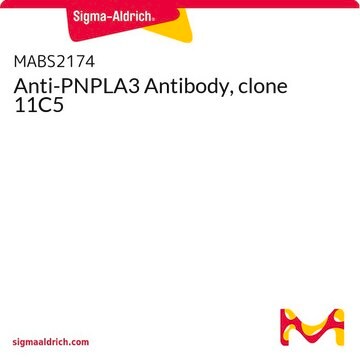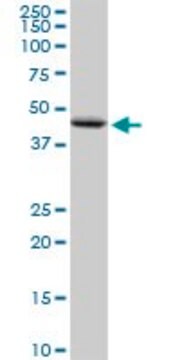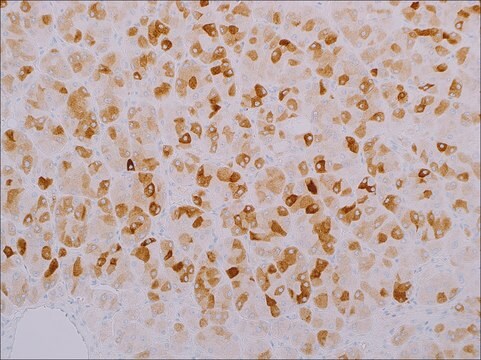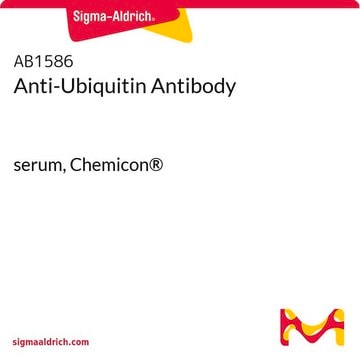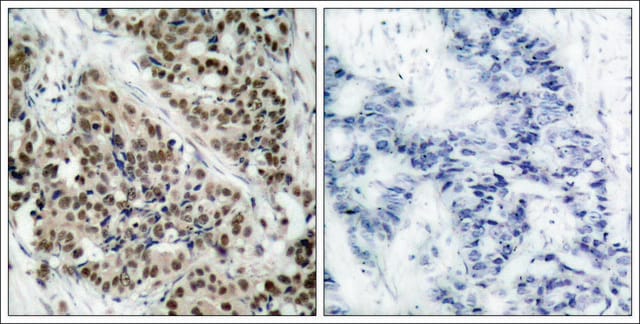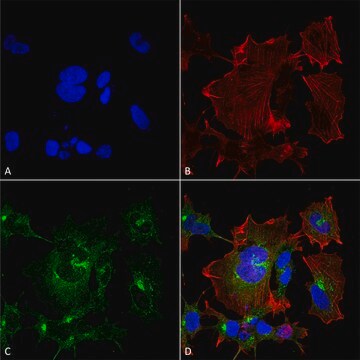MABS2173
Anti-PNPLA3/Adiponutrin Antibody, clone 19A6
Synonym(s):
1-acylglycerol-3-phosphate O-acyltransferase Pnpla3;EC:2.3.1.51;Acylglycerol transacylase;Adiponutrin;ADPN;Calcium-independent phospholipase A2-epsilon;iPLA2-epsilon;Lysophosphatidic acid acyltransferase;Patatin-like phospholipase domain-containing protei
About This Item
Recommended Products
biological source
rabbit
Quality Level
conjugate
unconjugated
antibody form
purified antibody
antibody product type
primary antibodies
clone
19A6, monoclonal
mol wt
calculated mol wt 45.77 kDa
observed mol wt ~43 kDa
purified by
using protein G
species reactivity
mouse
packaging
antibody small pack of 100 μg
technique(s)
immunoprecipitation (IP): suitable
western blot: suitable
isotype
IgG
epitope sequence
Internal
Protein ID accession no.
UniProt accession no.
shipped in
ambient
target post-translational modification
unmodified
Gene Information
human ... PFN2(5217)
General description
Specificity
Immunogen
Application
Evaluated by Western Blotting in Mouse brain tissue extracts.
Western Blotting Analysis: A 1:125 dilution of this antibody detected PNPLA3 in Mouse brain tissue extracts.
Tested Applications
Western Blotting Analysis: A representative lot detected PNPLA3 in Western Blotting applications (BasuRay, S., et al. (2017). Hepatology. 66(4): 1111-1124).
Immunoprecipitation Analysis: A representative lot immunoprecipitated PNPLA3 in Immunoprecipitation applications (BasuRay, S., et al. (2017). Hepatology. 66(4): 1111-1124).
Note: Actual optimal working dilutions must be determined by end user as specimens, and experimental conditions may vary with the end user
Physical form
Storage and Stability
Other Notes
Disclaimer
Not finding the right product?
Try our Product Selector Tool.
Storage Class Code
12 - Non Combustible Liquids
WGK
WGK 1
Regulatory Listings
Regulatory Listings are mainly provided for chemical products. Only limited information can be provided here for non-chemical products. No entry means none of the components are listed. It is the user’s obligation to ensure the safe and legal use of the product.
JAN Code
MABS2173-100UG:
MABS2173-25UG:
Certificates of Analysis (COA)
Search for Certificates of Analysis (COA) by entering the products Lot/Batch Number. Lot and Batch Numbers can be found on a product’s label following the words ‘Lot’ or ‘Batch’.
Already Own This Product?
Find documentation for the products that you have recently purchased in the Document Library.
Our team of scientists has experience in all areas of research including Life Science, Material Science, Chemical Synthesis, Chromatography, Analytical and many others.
Contact Technical Service